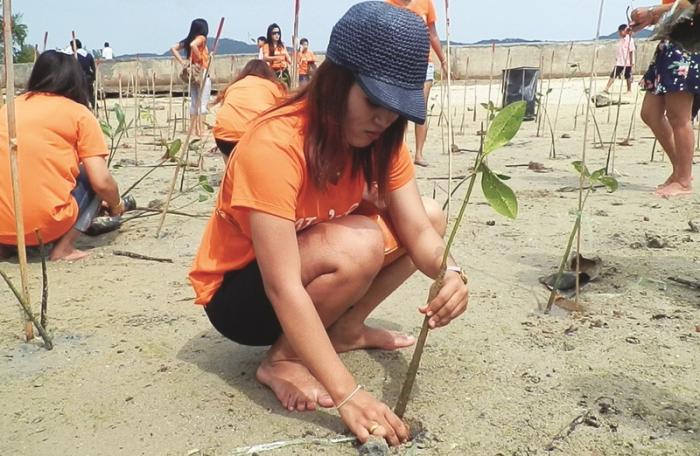Keep It Green: Mangroves – a vital eco-system component

PHUKET: Coral reefs attract far more publicity than mangrove swamps. After all, coral is spectacularly beautiful, and affords protection to some of the world’s most spectacular fishes – clown fish, parrot fish, wrasse and literally hundreds of other species.
From the air, mangrove swamps also look appealing, but close up are muddy and turbid with unsightly roots and often have a rank smell. Forget the aesthetics though. They are even more crucial to our marine environment than coral.
Consider this. Shrimps are big business in Thailand: the country is the third largest exporter of seafood. Since the 1970s, the Thai government has promoted intensive shrimp production, especially in coastal areas. When descending to Phuket Airport, one passes over many shrimp farms. These rectangular ponds created in part by obliterating the stands of mangroves that once fringed the island’s eastern shoreline.
This rapid expansion has come at the cost of thousands of hectares of mangroves, a complex and fecund ecosystem with a uniquely rich bio-diversity, which embraces other trees, marine plants and animals, and key micro-organisms. In global terms, and according to figures released by the World Resources Institute, the world lost between 9,000 and 25,000 hectares of mangroves between 2001 and 2012. Shrimp aquaculture is probably the biggest single contributor. One estimate suggests that 38 per cent of this depletion is attributable to shrimp farm development.
So these farms, economically so important, have come at a huge cost to the marine environment, especially in Phuket and South Thailand. Noppadol Tawee is a shrimp farmer in Surat Thani. His ponds occupy the site of ancient mangrove swamps. For some years he made lots of money; other years, none at all. Why? Because his shrimps fell sick and died. They died because they lived in de-oxygenated water polluted by artificial additives, an environment which made them prone to mortal disease.
It was not only the shrimp which were affected. The antibiotics, fertilizers, disinfectants and pesticides which were indiscriminately used, found their way into canals, rivers and seas without being treated. This toxic wastewater resulted in massive fish depopulation. “The fishermen couldn’t catch anything, and we couldn’t grow oysters anymore,” says Preecha Danchulchai, the owner of an off-shore oyster farm in the area.
Shrimp farmers were advised to plant mangroves in the middle of their ponds and to discontinue the common practice of administering antibiotics, fertilizers and artificial food. The result? As Noppadol says: “The shrimp have flourished. They get everything they need from the mangroves.” In other words, mangroves provided a natural and complete solution to the problem.
It has to be said that replanting mangroves does not always work. In Phuket, there have been laudable communal efforts to replace denuded areas of shoreline with trees. But mangroves are ecosystems which have a complex relationship with the tide: the young seedlings need to be periodically submerged in seawater in order to survive. Moreover, there are about seventy different species of mangrove: the wrong species have often been planted in areas inherently unsuitable for their survival.
Nonetheless, the continued existence of our mangrove swamps is crucial. They are absolutely unique: they not only filter and purify the water, they provide essential nutrients. In addition, they provide breeding conditions for most species of tropical fish, absorb massive amounts of carbon, and pump oxygen into our skies. They even provide a natural barrier to the erosive powers of the ocean.
While man continues to ignore the massive problem of waste water, at least the mangroves are doing their considerable best to help.
If you have gardening or environmental concerns, contact Patrick at drpaccampbell@gmail.com. Many of his creative and academic publications can be found at his website: Green galoshes WordPress.
— Patrick Campbell
Latest Thailand News
Follow The Thaiger on Google News:


























